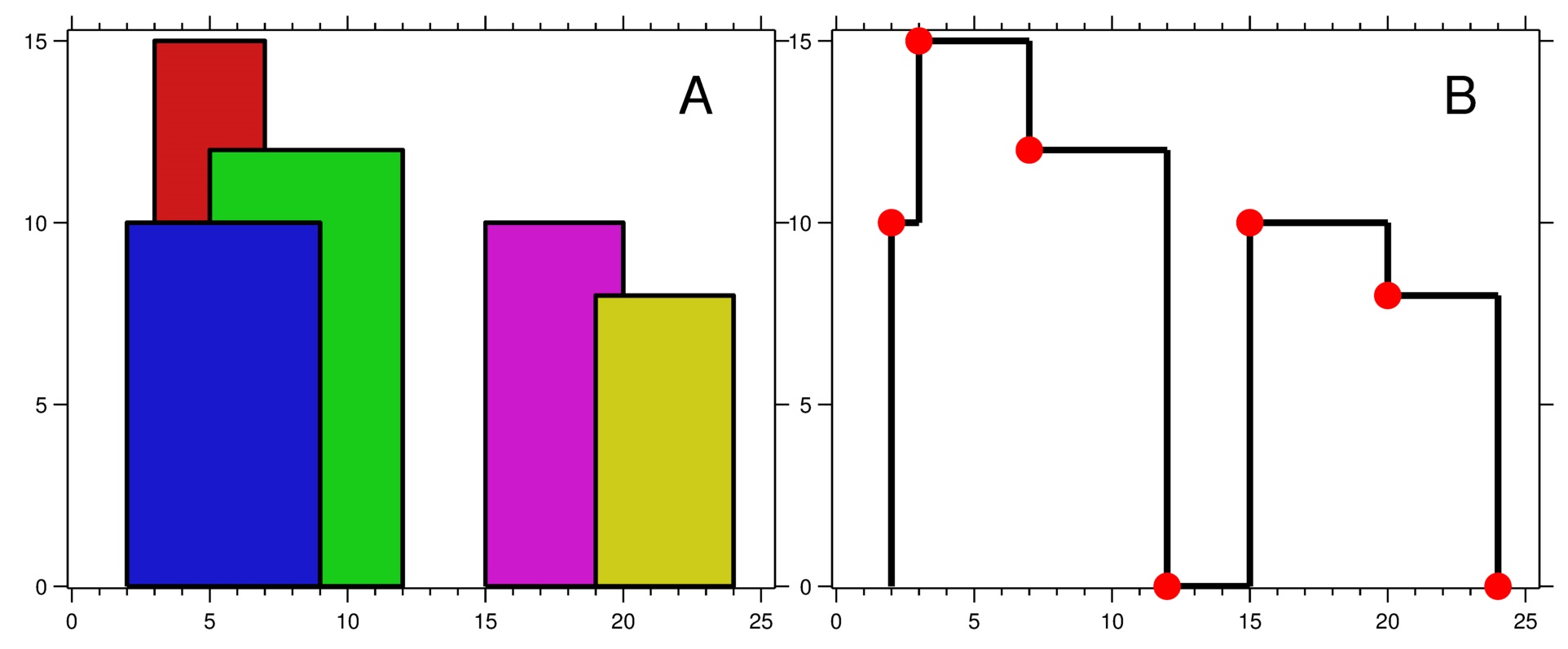LeetCode in Kotlin
218. The Skyline Problem
Hard
A city’s skyline is the outer contour of the silhouette formed by all the buildings in that city when viewed from a distance. Given the locations and heights of all the buildings, return the skyline formed by these buildings collectively.
The geometric information of each building is given in the array buildings where buildings[i] = [lefti, righti, heighti]:
leftiis the x coordinate of the left edge of theithbuilding.rightiis the x coordinate of the right edge of theithbuilding.heightiis the height of theithbuilding.
You may assume all buildings are perfect rectangles grounded on an absolutely flat surface at height 0.
The skyline should be represented as a list of “key points” sorted by their x-coordinate in the form [[x1,y1],[x2,y2],...]. Each key point is the left endpoint of some horizontal segment in the skyline except the last point in the list, which always has a y-coordinate 0 and is used to mark the skyline’s termination where the rightmost building ends. Any ground between the leftmost and rightmost buildings should be part of the skyline’s contour.
Note: There must be no consecutive horizontal lines of equal height in the output skyline. For instance, [...,[2 3],[4 5],[7 5],[11 5],[12 7],...] is not acceptable; the three lines of height 5 should be merged into one in the final output as such: [...,[2 3],[4 5],[12 7],...]
Example 1:

Input: buildings = [[2,9,10],[3,7,15],[5,12,12],[15,20,10],[19,24,8]]
Output: [[2,10],[3,15],[7,12],[12,0],[15,10],[20,8],[24,0]]
Explanation: Figure A shows the buildings of the input. Figure B shows the skyline formed by those buildings. The red points in figure B represent the key points in the output list.
Example 2:
Input: buildings = [[0,2,3],[2,5,3]]
Output: [[0,3],[5,0]]
Constraints:
1 <= buildings.length <= 1040 <= lefti < righti <= 231 - 11 <= heighti <= 231 - 1buildingsis sorted byleftiin non-decreasing order.
Solution
import java.util.TreeMap
class Solution {
fun getSkyline(blds: Array<IntArray>): List<List<Int>> {
val ans = ArrayList<List<Int>>()
if (blds.isEmpty()) {
return ans
}
val totalBuildings = blds.size
val buildings = Array(totalBuildings * 2) { i ->
if (i % 2 == 0) {
Building(blds[i / 2][0], blds[i / 2][2], true)
} else {
Building(blds[i / 2][1], blds[i / 2][2], false)
}
}
buildings.sort()
val skyline = TreeMap<Int, Int>()
skyline[0] = 1
var prevMaxHeight = 0
for (building in buildings) {
val height = building.height
if (building.isStart) {
skyline[height] = 1 + (skyline[height] ?: 0)
} else {
skyline[height] = (skyline[height] ?: 1) - 1
if (skyline[height] == 0) skyline.remove(height)
}
val xCoor = building.xCoor
val curMaxHeight = skyline.lastKey()
if (prevMaxHeight != curMaxHeight) {
ans.add(arrayListOf(xCoor, curMaxHeight))
prevMaxHeight = curMaxHeight
}
}
return ans
}
private class Building(val xCoor: Int, val height: Int, val isStart: Boolean) : Comparable<Building> {
override fun compareTo(other: Building): Int {
return COMPARATOR.compare(this, other)
}
private companion object {
private val COMPARATOR = Comparator<Building> { a, b ->
when {
a.xCoor != b.xCoor -> a.xCoor.compareTo(b.xCoor)
a.isStart && b.isStart -> b.height.compareTo(a.height)
!(a.isStart || b.isStart) -> a.height.compareTo(b.height)
else -> if (a.isStart) -1 else 1
}
}
}
}
}

